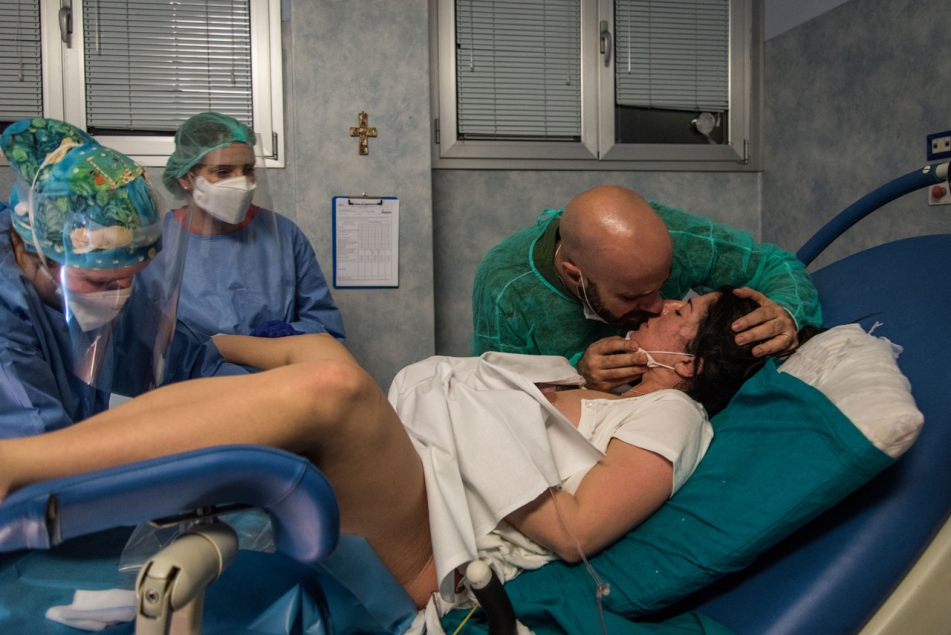HAPPINESS
Coronavirus, when the taste of happiness is even more special
by Pierangelo Sapegno

Even if happiness forgets you sometimes, you must never completely forget about it. Jacques Prévert didn’t get to experience Covid, but he witnessed other wars and other days like those we've just been through, when it seemed like we'd been left alone with our fears. We had to constantly remember our happiness. We had to be capable of waiting for it. Like in those images in Parma's Maggiore Hospital, with all those doctors and nurses dressed up like deep sea divers with their puffed-up white overalls and face masks covering the eyes which sang with joy, hugging each other as they hoisted a big sign declaring “Pavilion 26 finally closed.” The Covid pavilion. There were no more patients. But when the lockdown was in full swing we were moved by images of the doctors and nurses at the Sant’Orsola Hospital in Bologna all singing the great late Italian star Lucio Dalla's song “Attenti al lupo” (Beware of the Wolf) together, each of them managing to put a smile on those tired, bedraggled faces, with bags under their eyes and long beards on their chins. They weren't pretending to be happy. They really were happy. Because they were helping others.
It's because happiness is a strange thing, something that we struggle to recognise in the midst of our constant, tiresome search for its meaning, but there is no meaning. Sandro Formica, Professor of Self-Science andthe Economics of Happiness at Florida International University in Miami, says “you need to train it every day, just like a muscle.” Even when it's not there, when it seems to have forgotten you. You just need to share your experiences with the people you respect, open up to them and listen, dream even, imagine a better future. This is what the doctors and nurses did in Bologna. They didn't forget it. Diarti Mane, on the other hand, a labourer of Albanian origin, discovered it one day, a day just like any other during this Covid emergency, in the Humanitas San Pio X Hospital in Milan. This was when his wife Luna Melchiorri gave birth to Camilla and he followed everything on a tablet, crying tears of happiness while wearing a face mask, kneeling on the bed of a semi-dark room, holding his head in his hands. And there was Karim Mellano, a furloughed Michelin employee, who saw the birth of his twins Rebecca and Matilde, his eyes fixed on his wife's face, Giorgia Delfino, as they also cried together in happiness: "the babies are well", he said. “They're a blessing, wonders of nature as it continues its course. Even during these terrible times, life keeps shining.”
Happiness is no out-of-body experience. It's an “inside job,” something you need to nurture within yourself and share with others. The smiles of S. C. from Turate and Marjan M. from Milan, working women, mothers, that the pandemic left jobless, with children to raise, and who were given support by the San Giuseppe Fund set up by the diocese of Milan. "I went to the priest just to ask if he could find me a job, as a cleaner in someone's house," S. C. explained, "because I had to pay the rent and feed my 16-year-old son." They say money doesn't make you happy, but it helps you to live. Empathy is happiness, that which others give to us and that we give them. We need to learn to look for it within ourselves. A second-year, secondary school girl wrote in her school newspaper that "happiness during Covid is to see who we really are, to understand ourselves deep down". You don't need much to be happy, she wrote. "After a month confined to the house, I took my dog for a walk in the little bit of countryside near my home. I love my dog. I started to run, I could feel the breeze in my hair and it felt like I was flying." Happiness is such a small thing, it's us who turn it into something big. And it's not about how much of it we've got, it's how much we appreciate it, that's what makes us happy. Too often we're not capable of holding onto it, that's precisely because we don't appreciate it enough. And if that happens, we only recognise it by the noise it made when it left. Prévert said that. But life says that, too.
(© Pierangelo Sapegno/La Stampa, July 15, 2020)
(In the photograph: at Buzzi Hospital in Milan, Serena has just given birth to Edoardo. The new dad, who is overcome with emotion, kisses his partner.)